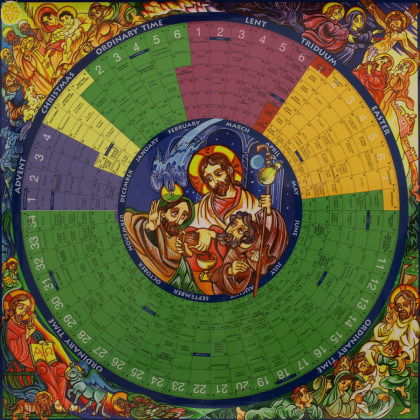Anti-Spontaneity
Devra Torres | Nov 2, 2012 | 1 cmt
Last week, we considered the uses and abuses of spontaneity. But what about the opposite extreme?
According to legend, my grandfather was once discovered to have penned the reminder “Kiss Thelma” on his to-do list.

Thelma was his wife.
This is as good an illustration as any that Grandpa Lenny was not a spontaneous man.
Now, it’s true, as Jacques Philippe points out, that steady, proven faithfulness, year in and year out, is a far more convincing proof of love than sporadic bursts of passionate affection alternating with stretches of neglect. But what to make of such, well, extremely steady steadiness as my grandfather’s?
Did he love his wife? Yes, of course he did. They stayed together until death did them part (which was a long, long time), and they devised some inventive compromises along the way.
Nana liked adventure and Lenny liked predictability and comfort, so they went to Africa on safari

but with a tour group, on a schedule, in nice hotels.

When they retired, Nana took up sculpting, painting, piano, and whale watching.
Lenny joined the Service Corps of Retired Executives and woke every morning precisely at 4:30, walked two miles to Dunkin Donuts, ate one donut, drank one cup of coffee, and walked back.

It was a matter of temperament, or Lenny-ness, or something. He wasn’t being heartlessly mechanical. If he wrote “Kiss Thelma” on his list, that was his own peculiar way of honoring her.
But if the alternatives are mechanical fulfillment of duty and unreliable, passionate spontaneity, where should personal action fall?
Well, it’s something of a false dichotomy. If we were meant to mimic machines, we wouldn’t have been given free will. If we were meant to act like irrational bundles of feelings, we wouldn’t have been given an intellect.
Just as in our reflections on rote and make-it-up-as-you-go-along prayer, we’re perfectly free to take the “both-and” approach. (This is not really the same as the mean between the extremes. We’re not looking for just the correctly calibrated mixture of “mechanically perfunctory” and “unreliably volatile,”

but rather for something above the continuum.)
Catholics, for instance, can count on the predictable rhythm of the liturgical year: the seasons, the feasting, the fasting.

But that recurring element is not supposed to comprise the entirety of our dealings with God. We don’t cycle around aimlessly forever: we have a Genesis, an Incarnation, and an Eschaton. We’re not trapped in the Myth of the Eternal Return.

In our dealings with each other, too, there’s also a continual interplay between the objective and the subjective. The objective truth about right and wrong is the stable and predictable element. But it doesn't exclude the spontaneous, creative, inspired messiness of personal action.
This comes up in childrearing, too: “Rules without relationship equals rebellion,” goes the pop-psychology proverb, and “relationship without rules equals chaos.” Children need both, and so, as God knows, do we.
So, yes, He gave us the Commandments, but, as Fr. John Riccardo

points out, we need to see them in context in order to have any clue what they’re all about. They were bestowed on a people who had just escaped 400 years of cruelest slavery. The Commandments were a path out of that: they were neither meant nor understood as a burdensome imposition. Only if we grasp this will we have any idea why someone would celebrate a feast called Simchat Torah (“Rejoicing in the Law”).

(After all, we don’t have a day dedicated to “Rejoicing in the Regulations.”)
What we need to cultivate, I guess, is an adventurous, imaginative, creative, steady, stable, reliable faithfulness. What the world needs is neither just the Nana Approach nor just the Lenny Approach, but a marriage of the best elements of both.


Comments (1)
Katie van Schaijik
Nov 6, 2012 9:15am
That link between liberty and law is so mysterious and amazing, isn't it?
Same thing is at the root of the American Idea: "Confirm thy soul in self-control, thy liberty in law."
Habitual giving in to impulse leads to slavery. Ordering ourselves toward the True leads to freedom.
Key, though, is that we have to order ourselves.